Rating: 4.5 out of 5




![]()
Wow, just wow. It has been a while since a biographical drama like Spotlight has caught and kept my attention. At first, I was like whatever because the film primarily deals with the investigative journalism of the Church. This made me not want to watch it because I am NOT a church person. I tell everyone that if I walked into a church, I would burst into flames. Also, I really didn’t want to watch a film about going into detail on what the Church does. Priest touching little boys has been around for ages, so that really didn’t interest me. Yet, I watched this film and was drawn in, and it kept my attention. I was fascinated by what the Spotlight team found.
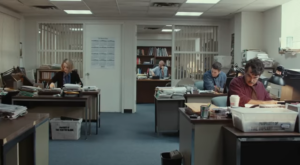
Based on the true story of the Spotlight team at the Boston Globe. The film follows the investigative journalist unit and its investigation into cases of widespread and systemic child sex abuse in the Boston area by numerous Roman Catholic priests. The film is based on a series of stories by the Spotlight team that earned The Globe the 2003 Pulitzer Prize for Public Service.
Spotlight has been at the Boston Globe since the 1970s. We learn that the group can spend either months or years on a single story. The film begins in 2001, with the Spotlight team that consists of its editor Walter “Robby” Robinson (Keaton), and his team of editors Michael Rezendes (Ruffalo), Sacha Pfeiffer (McAdams), and Matt Carroll (James). Robby and his team report to the assistant managing editor, Ben Bradlee Jr. (Slattery). After the former editor steps down, the Boston Globe appoints Marty Baron (Schreiber) to the post from Florida. After hearing from Robby what the Spotlight team was investigating, he decides that the current project should be put on hold. Robby wants them to focus on allegations against a Catholic priest and claims sexual abuse against a minor. The team believes that there was a subsequent cover-up by the Archdiocese of Boston, Cardinal Bernard Law.
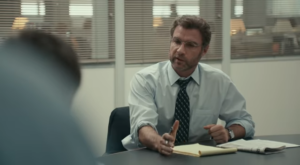
The crew was at first hesitant as they should be because it’s the Church. They believed that Baron was an outsider to Boston. He really doesn’t have a clear idea of what was essential to the city’s readers. The team’s first task was trying to get some court documents unsealed, where they would need a court order. The Church and its parishioners interpret this as The Globe suing the Catholic Church. This could have significant and negative consequences for The Globe because a majority of their subscribers are Catholic.
Robby and his team first start with speaking to lawyers, Eric MacLeish and Mitchell Garabedian, who have or are working on alleged sexual abuse cases perpetrated by Catholic priests in and immediately surrounding Boston. They also speak with known victims such as Phil Saviano, the head of the Survivors Network of those Abused by Priests (SNAP), and insiders in the Catholic Church. As their investigation becomes deeper and deeper, they soon learn that the problem is far deeper than they thought. They soon find out that the cover-up just doesn’t deal with one or two priests and victims but dozens or priests and hundreds of victims. While bringing their results to Baron, Baron states that they change their focus from the priests to the Archdiocese’s systemic problem, not only covering up the abuse but, in reality, doing nothing to stop it and thus condoning it. Their goal is not only the end product of an important story but to make a genuine and strong change in the system. As the reporting continues, they soon come to some unpleasant realizations, and the cover-up the Church goes to in making sure nothing sees the light of day.
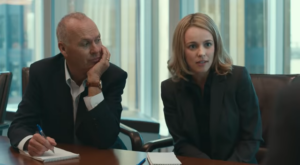
At first, the film started off pretty slow for me. It started back in the day with two kids reporting on a priest, but like always, it was swept under the rug by the police. I saw that and was like that happens to black people every day, but I let the movie roll. Like I said, it took a while to get started and moving. The scene where Phil Saviano showed up the first time didn’t interest me because the movie did such an excellent job of portraying what happens in movies. People think he is a crazy dude just making noise, but no one really cares about what he says. I would say the part of his story that made my ears perk was when he said he mailed something to the Globe five years ago. I first thought there was significant corruption with the papers, and the Church got to them.
My interest level was a little low until they started interviewing victims. That was when the film began to get really good and interesting and went full steam ahead. When they interviewed those two victims, everything changed because it was in detail and how they told their stories. How the priests were like God to them and the progression of each thing they did to molest the boys. First, it was hello and then a dirty joke to a porno mag until they were trapped. The emotional depth that each person goes through.
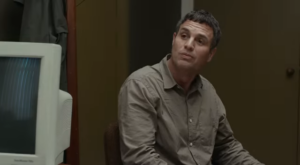
Speaking on the emotional depth of the film. The film shows the trauma and concern this had on the team and how their own “beliefs” are pushed. Carroll learns that one of the priest treatment centers is on the same block as his family’s home. Pfeiffer finds herself unable to attend Church with her Nana after witnessing the sheer scope of the investigation. Rezendes pushes to get the story out quickly to prevent further abuse. Robinson faces pushback from some of his close friends whom he learns were complicit in covering up the phenomenon. Once again, this is a crushing blow for many people in a city like Boston, where the Catholic Church has a prominent influence.
I will say that the way the investigating team interviews each person is fascinating. First, the team looks through logs and sees that many people take the so-called “sick leave” to get out of things. It was crazy to see the list of names. What is even crazier was when they speak to Richard Sipe, a former priest who worked at trying to rehabilitate pedophile priests. That through his experience, 50% of priests are not celibate, though most are in relationships with other adults. Just think about that for a second. Half of the priests are not what they say they are. The biggest revelation was how many priests should be molesting kids. When the team said 13, he was like, naw, that number is way low. When he said that the number should be around 6% of all priests in Boston for a total of 90, that is when shit hit the fan, and I was entirely in this film. The team came up with 87 names where they start finding their victims to back up their suspicions.
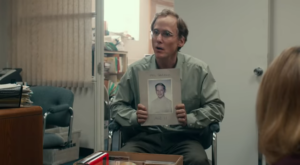
One of the downright crazy scenes was when Pfeiffer interviewed a former priest. He seemed so nice, and when she asked him if he ever molested kids, he was so cool with it and said yea like nothing was wrong. It wasn’t a yea like he didn’t care; it was a yea because he didn’t see anything wrong. He kept saying that he was sexually aroused, and it was okay and that he never raped the kids because he knew the difference between rape and molestation because he was raped. When Pfeiffer came back to the office, she explained her shocked at how that priest didn’t see anything wrong. I was hoping the film would go back to him.
Via: YouTube/Open Road Films
The entire cast and director, Tom McCarthy, made this film great. It is why it won the Academy Award for Best Picture. For the cast, no one seemed to dominate the picture, and it seemed like everyone had an equal amount of time. I didn’t feel like no one overacted at all. Everyone was outstanding in some way, shape, or form, and they drew you in. The direction that McCarthy gives the cast is just something. The slow build-up as the investigation goes deeper and deeper is truly special. The further the team goes, the more invested I became in the film.
I will admit, I wasn’t high on this film, but after watching it, I am happy that I stopped and viewed it. It was by far interesting and entertaining. The investigation and the depth of the story were fascinating. The entire cast was great, and the direction that McCarthy showed was just right. Spotlight is one of the best journalistic films around.